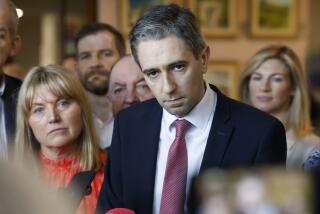Ex-Sen. Mitchell OKd as Chair of N. Ireland Talks
- Share via
BELFAST, Northern Ireland — After two days of angry wrangling, delegates to a historic peace conference hoping to end decades of ethnic and sectarian violence in Northern Ireland agreed early today to the appointment of American George Mitchell as chairman--and some right-wing supporters of continued British rule in the province walked out of the talks.
“George Mitchell is in the chair,” Billy Hutchinson, head of the small Progressive Unionist Party, told reporters as exhausted delegates headed home after midnight from a session that began Tuesday morning.
Opposition by pro-British conservatives to a key role for the former Senate majority leader derailed consideration Tuesday of substantive issues and reinforced initial negative impressions of the conference’s chances for success.
Details of the compromise that enabled Mitchell to be seated were lacking.
“Mitchell has been forced on us,” said Ian Paisley Jr., a negotiator for the right-wing Democratic Unionist Party led by his father, the Rev. Ian Paisley. The younger Paisley was one of about a dozen hard-line Protestant politicians who exited the talks.
Irish analysts had warned that if the unionists succeeded in sidelining Mitchell, that would lengthen the odds against a new cease-fire by the outlawed Irish Republican Army. Without a cease-fire, Sinn Fein, the IRA’s political arm, is barred from the talks.
“A man approved by the IRA and Sinn Fein is not acceptable,” the senior Paisley said during the debate Tuesday. A histrionic septuagenarian who had threatened to walk out of the talks if Mitchell was appointed, he is the patriarch of the extreme right among the unionists.
Mitchell--whose compromise proposals as the head of an international commission helped set the stage for the talks--was the choice of Britain and Ireland as chairman and is supported by moderate Roman Catholics at the talks, which opened Monday. Right-wing unionists, though, resent a foreigner being given a key role in what they consider an internal British matter.
For the second straight day Tuesday, Mitchell stayed clear of the conference, which convened in full session for only 15 minutes before beginning an informal search for a consensus. He did meet with some delegates to stress his neutrality.
Amid the political maneuvering, police in London on Tuesday charged a Northern Ireland man believed to be an IRA supporter of conspiracy in a bombing there Feb. 9 that killed two men and broke a 17-month cease-fire that the IRA refuses to reinstate.
Patrick McInley, a 32-year-old car mechanic, was remanded into custody until June 20. Five other people, three of them from Northern Ireland, have been arrested in the last week in connection with a series of bomb blasts in London that began with the explosion in the Docklands area.
Police say a truck used in the Docklands attack was bought in the Irish Republic, disguised in Northern Ireland and driven to Britain as the bomb carrier.
Under laboriously agreed-upon Anglo-Irish plans for the conference in Belfast, each attending party is to swear to six democratic principles outlined by Mitchell earlier this year as the ticket of admission.
These include an irrevocable renunciation of violence, a commitment to democratic and exclusively peaceful means of resolving political issues, total disarmament of paramilitary organizations and agreement to abide by the results of all-party negotiations.
Sinn Fein has said it would agree to the principles. But the IRA has said it will not surrender any arms until the conclusion of talks.
More to Read
Sign up for Essential California
The most important California stories and recommendations in your inbox every morning.
You may occasionally receive promotional content from the Los Angeles Times.













